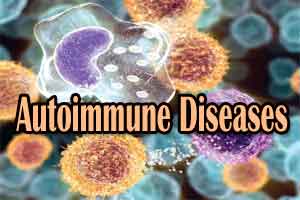- Home
- Editorial
- News
- Practice Guidelines
- Anesthesiology Guidelines
- Cancer Guidelines
- Cardiac Sciences Guidelines
- Critical Care Guidelines
- Dentistry Guidelines
- Dermatology Guidelines
- Diabetes and Endo Guidelines
- Diagnostics Guidelines
- ENT Guidelines
- Featured Practice Guidelines
- Gastroenterology Guidelines
- Geriatrics Guidelines
- Medicine Guidelines
- Nephrology Guidelines
- Neurosciences Guidelines
- Obs and Gynae Guidelines
- Ophthalmology Guidelines
- Orthopaedics Guidelines
- Paediatrics Guidelines
- Psychiatry Guidelines
- Pulmonology Guidelines
- Radiology Guidelines
- Surgery Guidelines
- Urology Guidelines
Autoimmune diseases find therapeutic potential in Salt-Inducible Kinases

A new research report appearing in the May 2016 issue of the Journal of Leukocyte Biology, suggests that specific enzymes, called "salt-inducible kinases," may be able to help curb runaway inflammation associated with autoimmune diseases like Crohn's disease, arthritis, and psoriasis. In particular, Swiss researchers found that by inhibiting the effects of salt-inducible kinases, they were able to significantly limit the production of inflammatory molecules by certain types of human immune cells. This validates the therapeutic concept of increasing local levels of anti-inflammatory IL-10 by the human immune cells and combining it with reduction of proinflammatory cytokines.
"Our laboratory studies further expand and validate the potential therapeutic implications of the use of salt-inducible kinase inhibitors for the treatment of immune-mediated inflammatory diseases," said Maria Stella Lombardi, Ph.D., a researcher involved in the work from the University of Geneva in Switzerland. "The development of novel potent, selective, and drug-like inhibitors of the these pathways will allow us in the near future to test them in animal models of chronic inflammatory and autoimmune diseases."
To make their discovery, scientists used two structurally unrelated small molecules salt-inducible kinase inhibitors or genetic interference approaches called RNAi to confirm that salt-inducible kinase inhibition attenuates proinflammatory cytokine production (TNF-alpha and IL-12 and, to a lesser extent, IL-6 and IL-1beta) while at the same time increasing the anti-inflammatory cytokine IL-10 secretion by cultured human monocytes, macrophages, and dendritic cells.
"Inflammatory disorders are one of the largest classes of disease we see in the clinic, but these disorders are very heterogeneous in terms of clinical manifestations and underlying cause," said John Wherry, Ph.D., Deputy Editor of the Journal of Leukocyte Biology. "This work has the potential to add a new class of therapeutics for inflammatory disorders that could be used in combination with other distinct therapies in hard-to-treat autoimmunity inflammatory conditions."
You can read the full article by clicking on the following link:
M. S. Lombardi, C. Gillieron, D. Dietrich, C. Gabay. SIK inhibition in human myeloid cells modulates TLR and IL-1R signaling and induces an anti-inflammatory phenotype. Journal of Leukocyte Biology, 2015; 99 (5): 711 DOI: 10.1189/jlb.2A0715-307R

Disclaimer: This site is primarily intended for healthcare professionals. Any content/information on this website does not replace the advice of medical and/or health professionals and should not be construed as medical/diagnostic advice/endorsement or prescription. Use of this site is subject to our terms of use, privacy policy, advertisement policy. © 2020 Minerva Medical Treatment Pvt Ltd